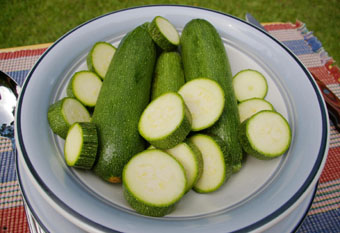
Zucchini's Magical Qualities
By Maggie Nichols
Thursday Review contibutor
At Thursday Review we like to talk a lot about miracle foods. No, that list does not include Oreo Cookies or Cheez-Its, though I agree that sometimes those items perform a miracle by making me an entire package of something with little value other than its dubious location on the decadence scale. A few years ago, in an effort to lose weight and feel better, I gave both of those things up—and, though I’ve never been a heroin addict, I suspect the experience of withdrawal was similar. (Minor digression).
One food I embraced: zucchini.
Zucchini is one of those no-brainer foods: it is loaded with good taste and quality (it even looks healthy), it contains a lot of stuff that reduces risk to cancer and other diseases, and it is packed with vitamins and minerals which play a positive role in nearly every part of your body.
Zucchini is high on the list of foods which are antioxidants. That means that a few servings of zucchini each week can boost your body’s immune system and literally slow down the aging process. Oxidation, in case you were wondering, is the normal process of cellular breakdown of anything that contains oxygen. Just as exposed metals break down in the onslaught of rust, so too will your body deteriorate as the routine process of oxidation attacks your cells. An antioxidant is any compound which halts or slows that process. So that means antioxidants are our friend, and any food which contains them is something we should eat more often.
Among the zucchini’s most prominent antioxidants is Vitamin C. And Vitamin C, as we have written in these pages previously, is a winner in every respect. It is impossible to get too much Vitamin C; the human body absorbs it quickly and effectively, and takes in exactly what is required, expelling the rest through bodily fluids. Even a small serving of zucchini packs in the Vitamin C.
Therefore…
Eating zucchini improves your intake of Vitamin C, which means your body can more easily resist common problems like colds and flus. But it gets better.
Combining Vitamin C with the lutein found naturally in zucchini makes for good eye health; combining Vitamin C with its various anti-inflammatory qualities means that zucchini can reduce asthma symptoms (some studies go as far as to suggest it “cures” asthma, but not all doctors are convinced of that broad claim); and zucchini’s high content of Vitamin C as an antioxidant element means that zucchini can help reduce issues of bruising, skin irritations, scurvy and rashes. Though the studies are not complete, some think that a moderate intake of zucchini (along with yellow squash and other gourd foods) can reduce the effects of allergies.
Doctors encourage older patients to get plenty of zucchini and squash for all of the above reasons (especially to prevent bruising and speed up recovery from skin issues), and they urge younger patients to do the same, especially in an age where allergies and asthma rates are on the rise, and a world in which skin cancer rates have also increased.
And that brings us to the Big C word: cancer. Zucchini falls into a special category of foods known for its direct relationship to lowering cancer risk. Numerous recent medical studies, several of them involving large numbers of participants, indicate that zucchini—like squash and broccoli—may be extremely valuable in reducing the risk of internal cancers, such as colon, esophageal and stomach cancer. Like squash and broccoli, this is due to both its high fiber content, as well as its other healing and resistance properties, including high levels of Vitamin A, high levels of folate (folic acid), and a heavy dose of potassium.
The potassium content alone makes the zucchini a wonderful side-dish for people who have problems with leg cramps.
All of this—coupled with its zero fat, zero cholesterol content—makes the modest green zucchini a super food.
Now, here’s the great part, especially for you people who live by convenience in your kitchen: zucchini is easy to cook. In fact, it requires virtually no culinary skills at all. Zucchini can be sliced, just as you would slice yellow squash, and it can steamed quickly to desired texture in minutes. It can also be diced or sliced raw and added to green salads, or steamed lightly and added to pasta. Meaning: you have no excuse to not add zucchini to your diet, no matter how much of a slave to convenience you think you are in the kitchen.
Related Thursday Review articles:
Squash: Summer, Winter, Fall; R. Alan Clanton; Thursday Review; June 12, 2013.
Tasty Ways to Reduce Your Risk of Cancer; Thursday Review; September 17, 2013.
